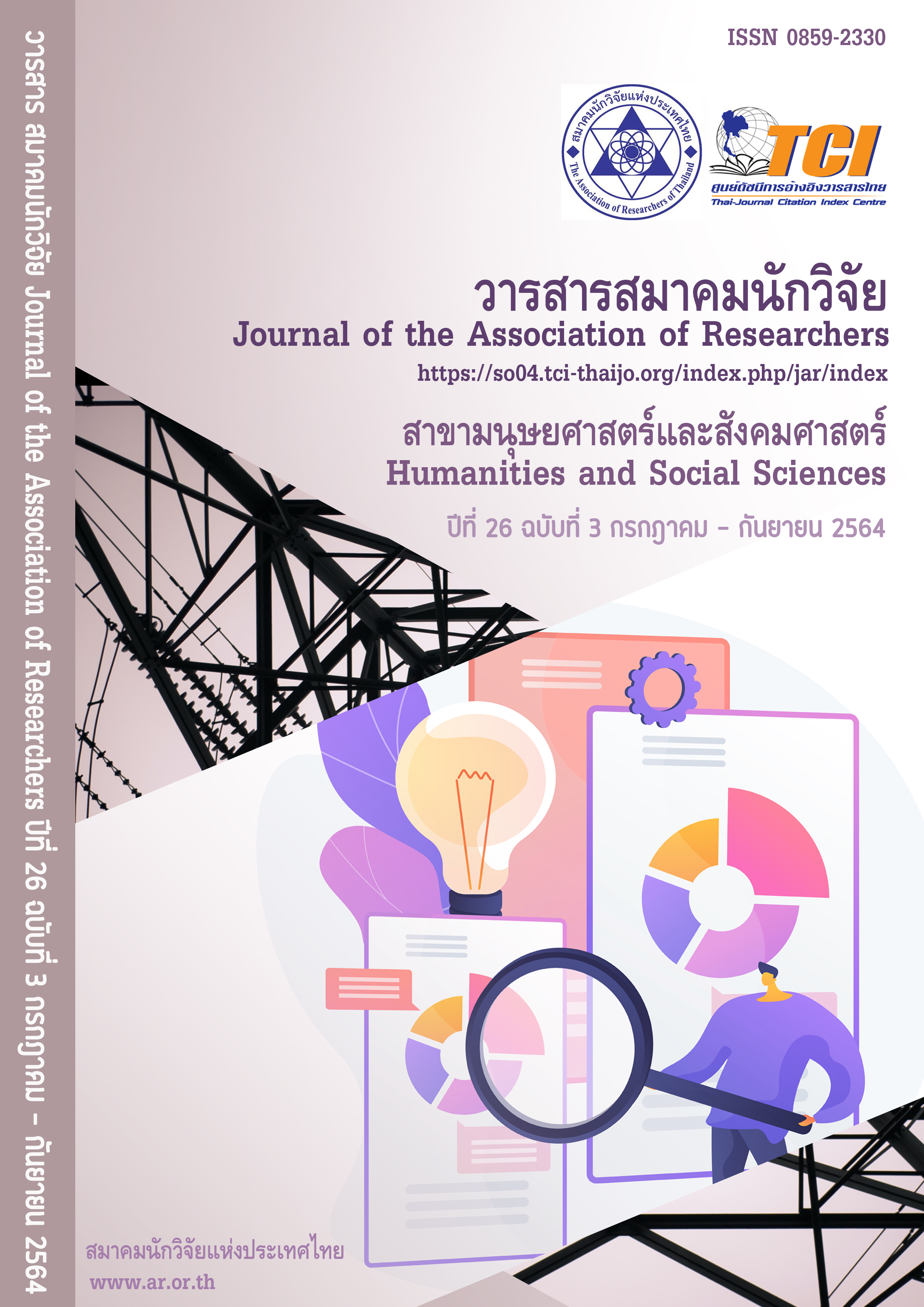Factors of Success in Online Learning Management of Basic Education Teachers
Main Article Content
Abstract
This research aimed to 1) study the factors affecting the management of online learning and 2) study the relationship between factors affecting the online learning management of school teachers under the Office of the Basic Education Commission. The sample group used in the research was 400 teachers teaching basic education nationwide and selected a specific sample. The research instruments were questionnaires, collected by online questionnaire. The data were analyzed by percentage, mean, standard deviation, and test the hypothesis on the relationship of the learning management model to the success factors in the learning management by Chi-square. The results showed that 1) Tools used in the learning management system to assign homework assignments and projects, communication with learners, lectures and learning activities, the addition of various sources of information to enhance knowledge, and learning assessments are chat rooms. Most of the sample used social media as a tool for organizing online classes. The vast majority of online teaching and learning activities are post-study exercises including post-study assignments 31.50 percent 2) The overall level of success in online learning management was high (mean = 3.95, SD = .661). 3) The relationship of the learning management model to the success factor in the learning management found that the success factor in the analytical online learning management, design and development, and assessment was a relationship with the tools used in the learning management system, social media tools, and learning activities that were significantly different at the .05 level.
Article Details
บทความที่ปรากฏในวารสารนี้ เป็นความรับผิดชอบของผู้เขียน ซึ่งสมาคมนักวิจัยไม่จำเป็นต้องเห็นด้วยเสมอไป การนำเสนอผลงานวิจัยและบทความในวารสารนี้ไปเผยแพร่สามารถกระทำได้ โดยระบุแหล่งอ้างอิงจาก "วารสารสมาคมนักวิจัย"
References
จินตวีร์ คล้ายสังข์. (2554). อีเลิร์นนิง เว็บไซต์ & คอร์สแวร์ : ปัจจุบันและทิศทางในอนาคต. เอกสารประกอบการบรรยายการประชุมวิชาการระดับชาติด้านอีเลิร์นนิง ประจำปี 2554 อาคาร 9 อิมแพค เมืองทองธานี.
ฐาปนีย์ ธรรมเมธา. (2557). อีเลิร์นนิง: จากทฤษฎีสู่การปฏิบัติ. กรุงเทพฯ: บริษัท สหมิตรพริ้นติ้งแอนด์พับลิสชิ่ง จำกัด.
ถนอมพร เลาหจรัสแสง. (2545). Desiging e-Learning หลักการออกแบบและการสร้างเว็บเพื่อการเรียนการสอน. กรุงเทพฯ: ศูนย์หนังสือแห่งจุฬาลงกรณ์มหาวิทยาลัย.
ทรงลักษณ์ สกุลวิจิตร์สินธุ. (2560). การใช้เทคโนโลยีสารสนเทศ เพื่อการเรียนรู้ร่วมกันทางออนไลน์. Veridian E-Journal ฉบับภาษาไทย สาขามนุษยศาสตร์ สังคมศาสตร์ และศิลปะ. 10 (2): 437-450.
ปัณฑิตา อินทรักษา. (2562). การจัดการเรียนรู้ด้วยสื่อสังคมออนไลน์. วารสารศึกษาศาสตร์ มหาวิทยาลัยนเรศวร. 21 (4): 357-365.
วีซานา อับดุลเลาะ และ วุฒิชัย เนียมเทศ. (2563). การจัดสภาพแวดล้อมการเรียนรู้เพื่อส่งเสริมทักษะการเรียนรู้ในศตวรรษที่ 21 “แนวคิด ทฤษฎี และแนวทางปฏิบัติ". วารสารมหาวิทยาลัยนราธิวาสราชนครินทร์ สาขามนุษยศาสตร์และสังคมศาสตร์, 7 (2) กรกฎาคม – ธันวาคม: 227-246.
สำนักงานคณะกรรมการการศึกษาขั้นพื้นฐาน กระทรวงศึกษาธิการ. (2563). แนวทางการจัดการเรียนการสอนของโรงเรียนสังกัดสำนักงานคณะกรรมการการศึกษาขั้นพื้นฐานในสถานการณ์การแพร่ระบาดของโรคติดเชื้อไวรัสโคโรนา 2019 (COVID 19) ปีการศึกษา 2563. สืบค้นวันที่ 31 มกราคม 2564 จาก http://www.ptnpeo.moe.go.th/ptn2019/document/5524
Clark, C.R., & Mayer, E.R. (2003). e-Learning and the science of instruction. San Francisco: John Wiley and Son.
Khan, B. H. (1997). Web-based instruction. Englewood Cliffs, NJ: Educational Technologies Publications.
Richy, R. (1986). Theoretical and Conceptual Bases of Instructional Design. New York: Nicholas Publishing.
Sara, Al-Oraini. (2008). Learning Skills for Distance Learners: Providing 21st Century Learning Support. The Egyptian Assembly of the read the and knowledge 85.
Translated Thai References
Jintavee Khlaisang. (2011). E-Learning Website & Courseware: Current and Future Trends. Proceeding National Conference on E-Learning 2011 Impact Muang thong Thani.
Office of the Basic Education Commission, Ministry of Education. (2020). Guidelines for teaching and learning of schools under the Office of the Basic Education Commission in the Situation of the Coronavirus Disease 2019. Searched on 31 January 2021 from http://www.ptnpeo.moe.go.th/ptn2019/ document/5524
Pundita Intharaksa. (2019). Learning Management with Social Media. Journal of Education, Naresuan University. 21 (4): 357-365.
Songlak Sakulwichitsintu. (2017). Using Information Technology for Online Collaborative Learning. Veridian E-Journal, Silpakorn University. 10 (2): 437-450.
Thanomporn Laohajarassaeng. (2002). Designing e-Learning Principles and Ancestors. Bangkok: Chulalongkorn University Book Press.
Thapanee Thammametha. (2014). e-Learning: from theory to practice. Bangkok: Sahamitr printing and Publishing, Co, Ltd.
Wisana Abdulloh and Wuttichai Niemted. (2020). Arrangement of Learning Environment to Promote Learning Skills in the 21st Century “Concept Theory and Practice”. Princess of Naradhiwas University Journal of Humanities and Social Sciences, 7(2) July - December: 227-246.


